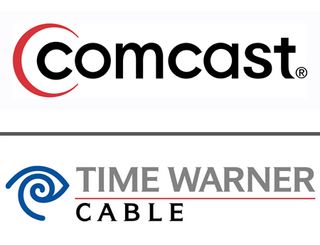Comcast, Time Warner Cable Set to Merge in $45B Deal

Comcast Corp. and Time Warner Cable, the two biggest U.S cable operators, have agreed to merge in a $45.2 billion transaction, according to sources familiar with the situation.
The deal, to be announced Thursday, appears to thwart cable pioneer John Malone, who acquired control of Charter Communications and has made several offers to buy Time Warner Cable, all of which have been rebuffed. Malone and Charter earlier this week nominated its own slate of directors for Time Warner's Board, setting in motion a potential proxy fight before Time Warner agreed to do a deal with Comcast.
Together, Comcast and Time Warner Cable would have 33 million subscribers, but they have agreed to sell off 3 million of those subscribers to keep their share of the U.S. cable market below 30%, which was once a cap on cable ownership that was struck down by the Court of Appeals in 2009.
The consolidation of the business would leave the combined company better able to compete with satellite rivals in the video market, who have a national footprint. The new company would also have more leverage as it tries to hold to programming costs, although as owner of NBCU and several regional sports networks, it would find itself on both sides of the discussion of rising license fees.
The deal would also give the new company a foothold in New York along with most other major markets, giving it the ability to expand to provide video, broadband and phone services to business customers, now mainly served by telephone companies.
As first reported by CNBC, a division of Comcast, Comcast will acquire Time Warner Cable in an all-stock deal with 2.875 share of Comcast being exchanged for each Time Warner share, making the bid worth $158.82 based on Comcast's closing stock price.
Comcast had to agree to a lengthy list of concessions to the government in order to get permission to acquire NBCU in 2011. This deal is also likely to be closely reviewed. Consumer advocates are already calling for the deal to be rejected on antitrust and other grounds.
Broadcasting & Cable Newsletter
The smarter way to stay on top of broadcasting and cable industry. Sign up below
Comcast became the largest cable operator by acquiring cable systems from AT&T. Those systems were bought from John Malone Tele-Communications Inc. in 1999. Comcast has also been in business with Time Warner Cable before, jointly buying Adelphia Communication and dividing up their subscribers to create clusters of customers in markets they are able to dominate.
In January, Charter put a $130 a share deal on the table that included about $83 in cash. That offer followed bids of $114 a share in June and $127 a share in October.
Charter CEO Tom Rutledge sent a letter to his counterpart at Time Warner Cable, Rob Marcus, outlining the January offer.
"I believe we have a significant opportunity to put our companies together in a way that will create maximum, long-term value for shareholders and employees of both companies. Our financing plan, which gives us the ability to deleverage during a period where our operating plan has sufficient time to be implemented, is prudent. Our history of operating performance is well understood," Rutledge said. "While we are preserving all options going forward, we remain open to real engagement. We would like to engage with you to conclude an agreement for a business combination that is beneficial for your shareholders and ours," Rutledge said.
Time Warner Cable's board unanimously rejected the bid, calling it "a third grossly inadequate proposal." But it said it was open to a deal with Charter at $160 a share, including $100 in cash.
"Charter's latest proposal is a non-starter. First and foremost, it substantially undervalues TWC," Marcus said.
"Not only is the nominal valuation far too low, but because a significant portion of the purchase price would be in Charter stock, the actual value delivered to TWC shareholders could be substantially lower give the valuation, operation, and signficant balance sheet risks embedded in Charter’s stock," he said. "We gave Charter our bottom line, but rather than pursuing this path, Charter has chosen to go public with its third low-ball offer trying to pressure TWC's Board into selling the company at a grossly inadequate price."
Jon has been business editor of Broadcasting+Cable since 2010. He focuses on revenue-generating activities, including advertising and distribution, as well as executive intrigue and merger and acquisition activity. Just about any story is fair game, if a dollar sign can make its way into the article. Before B+C, Jon covered the industry for TVWeek, Cable World, Electronic Media, Advertising Age and The New York Post. A native New Yorker, Jon is hiding in plain sight in the suburbs of Chicago.

